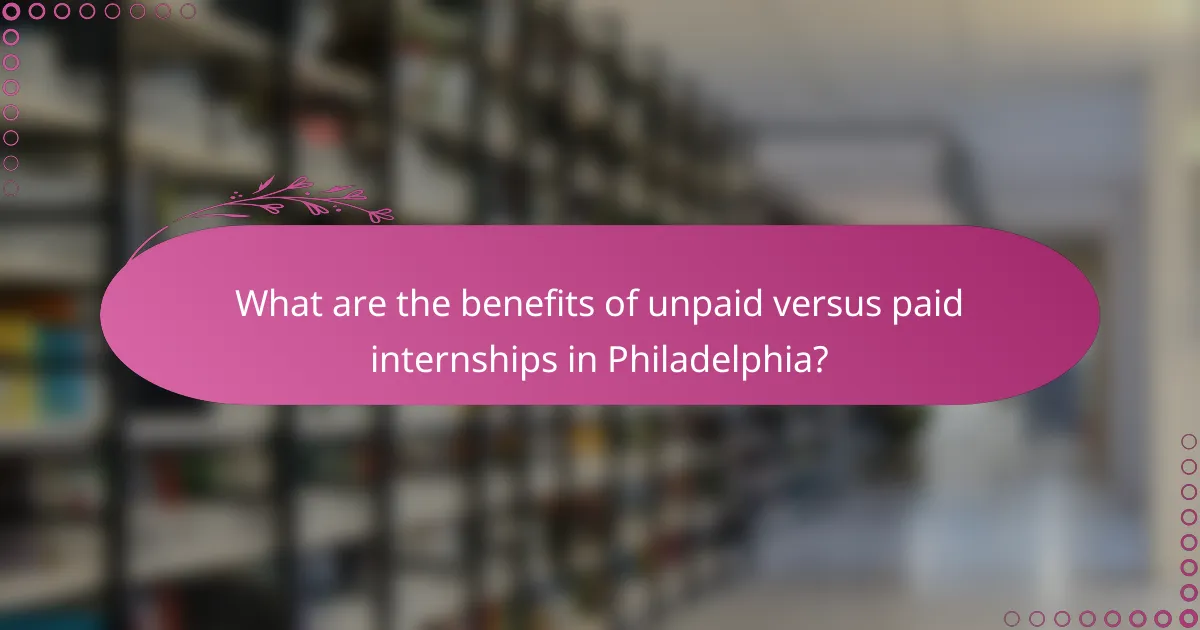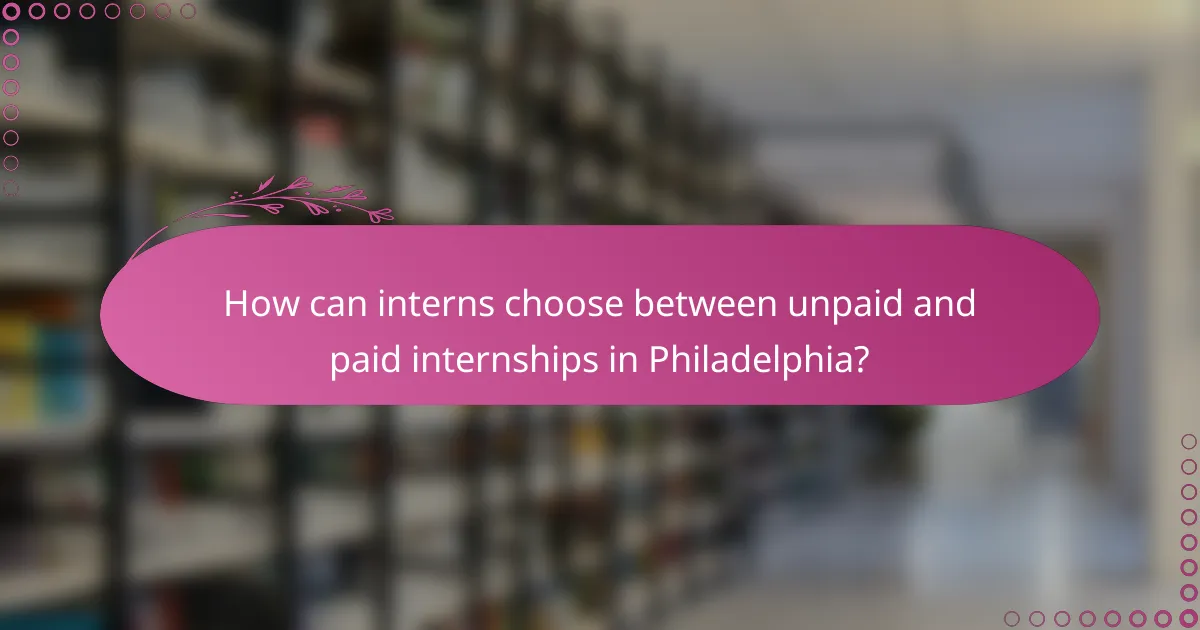

What are Philadelphia summer internships?
Philadelphia summer internships are temporary work opportunities offered during the summer months. They provide students or recent graduates with practical experience in their field of study. Many internships in Philadelphia are available in various industries, including education, healthcare, and technology. Some internships are paid, while others are unpaid. According to a report by the National Association of Colleges and Employers, paid internships can lead to higher job offers and salaries post-graduation. Interns often receive mentorship and networking opportunities that can enhance their career prospects.
How do unpaid and paid internships differ in Philadelphia?
Unpaid internships in Philadelphia typically do not provide any financial compensation to interns. These positions often focus on gaining experience and networking opportunities. Many unpaid internships are found in non-profit organizations or small businesses. In contrast, paid internships offer monetary compensation for the work performed. Paid positions are more common in larger companies and industries like finance, technology, and healthcare. According to a 2022 report by the National Association of Colleges and Employers, 60% of internships in Philadelphia are paid. This financial aspect can significantly influence an intern’s ability to participate, as unpaid internships may limit opportunities for those who cannot afford to work without pay.
What are the common characteristics of unpaid internships in Philadelphia?
Unpaid internships in Philadelphia commonly feature a lack of financial compensation. They often provide valuable work experience in various industries. These internships typically require a commitment to a specific duration, often aligning with academic calendars. Many unpaid internships are aimed at students or recent graduates seeking to enhance their resumes. They frequently offer flexible hours to accommodate academic schedules. Networking opportunities are a significant characteristic, allowing interns to connect with professionals in their field. Some unpaid internships may offer academic credit as compensation for work performed. Additionally, these internships often focus on skill development and practical application of classroom knowledge.
What are the common characteristics of paid internships in Philadelphia?
Paid internships in Philadelphia typically offer financial compensation to interns. These internships often provide valuable work experience in various industries. They usually require a commitment of 10 to 40 hours per week. Many paid internships also include mentorship from experienced professionals. Interns may receive training and skill development opportunities. Networking is often a key component, allowing interns to connect with industry professionals. Paid internships in Philadelphia frequently advertise through university career centers and online job boards. According to a survey by the National Association of Colleges and Employers, paid internships significantly increase job placement rates after graduation.
What factors influence the duration of summer internships in Philadelphia?
The duration of summer internships in Philadelphia is influenced by several key factors. These factors include the type of internship, whether it is paid or unpaid. Paid internships often have set durations, typically ranging from 8 to 12 weeks, aligning with standard summer schedules. Unpaid internships may offer more flexibility in duration, depending on the organization’s needs and the intern’s availability.
The industry sector also plays a significant role. For instance, internships in education or non-profits may have shorter durations, while those in finance or technology could extend longer due to project requirements. Additionally, academic credit requirements can affect duration. Internships tied to college programs may need to meet specific hour thresholds.
Employer expectations and project timelines further influence how long internships last. Companies may require interns for the entire summer to complete ongoing projects. Conversely, smaller organizations might offer shorter commitments based on their capacity. Lastly, intern availability and personal commitments can also dictate the length of the internship.
How does the duration of unpaid internships compare to paid internships?
Unpaid internships typically have longer durations compared to paid internships. Unpaid internships often last several months, frequently spanning the entirety of a summer or even a full academic semester. In contrast, paid internships are usually shorter, often ranging from a few weeks to a couple of months. Research indicates that unpaid internships can last up to 6 months, while paid internships generally do not exceed 3 months. This difference in duration can impact the type of experience and training interns receive.
What are the typical time commitments for summer internships in Philadelphia?
Typical time commitments for summer internships in Philadelphia range from 10 to 40 hours per week. Most internships last around 8 to 12 weeks during the summer months. Paid internships often require a full-time commitment of 30 to 40 hours weekly. Unpaid internships may offer more flexible schedules, sometimes requiring only 10 to 20 hours per week. These commitments can vary based on the industry and organization. Internships in fields like finance or tech generally expect full-time hours. Non-profit or educational internships may allow for part-time arrangements.

What are the benefits of unpaid versus paid internships in Philadelphia?
Unpaid internships in Philadelphia offer valuable experience and networking opportunities. They allow interns to gain skills and knowledge in their chosen field without financial compensation. This can lead to increased job prospects and recommendations from industry professionals.
Paid internships provide financial support while also offering similar experience and networking benefits. Interns can alleviate financial burdens, allowing them to focus more on their professional development. According to a survey by the National Association of Colleges and Employers, paid internships often lead to higher job offers post-graduation.
Both unpaid and paid internships contribute to building a resume. They enhance employability by demonstrating initiative and practical experience. However, paid internships may attract a wider pool of candidates due to financial incentives.
In summary, unpaid internships emphasize experience and networking, while paid internships combine experience with financial compensation, both enhancing career prospects in Philadelphia.
What advantages do paid internships offer to interns?
Paid internships offer financial compensation to interns. This compensation helps cover living expenses, reducing financial stress. Interns can gain valuable work experience while earning money. Paid internships often attract more qualified candidates. They provide a professional environment that enhances skill development. Interns can build a network of industry contacts through paid positions. Research shows that paid internships lead to higher job placement rates. According to a National Association of Colleges and Employers report, paid interns receive more job offers post-graduation.
How do paid internships impact financial stability for interns?
Paid internships significantly enhance financial stability for interns. They provide a source of income that can cover living expenses. According to a survey by the National Association of Colleges and Employers, paid interns earn an average hourly wage of $20. This income can alleviate financial stress during studies. Furthermore, paid internships often lead to better job offers post-graduation. Research indicates that interns with paid experience are more likely to receive job offers compared to their unpaid counterparts. Thus, paid internships contribute positively to the financial well-being of interns.
What skills can interns gain from paid internships that may differ from unpaid ones?
Paid internships often provide interns with skills that unpaid internships may not offer. Paid internships typically involve greater responsibility and more complex tasks. Interns in paid positions often receive formal training and mentorship. This structured guidance helps them develop professional skills more effectively. Additionally, paid internships may foster a sense of accountability due to the financial investment. Interns are likely to engage in networking opportunities that are more robust in paid roles. Companies may assign interns to meaningful projects that contribute to their portfolios. According to a survey by the National Association of Colleges and Employers, 70% of paid interns receive job offers compared to 37% of unpaid interns. This data highlights the career advancement skills gained through paid internships.
What are the potential drawbacks of unpaid internships?
Unpaid internships can lead to financial strain for participants. Many interns cannot afford to work without compensation. This limits access to opportunities for those from lower-income backgrounds. Unpaid internships may also result in a lack of valuable experience. Some employers may undervalue the contributions of unpaid interns. This can hinder their professional growth. Additionally, unpaid internships often have less structured training. Interns may miss out on mentorship and skill development. Research shows that unpaid internships do not significantly improve job prospects compared to paid internships. This highlights the potential drawbacks of unpaid opportunities.
How can unpaid internships affect an intern’s career trajectory?
Unpaid internships can significantly impact an intern’s career trajectory by limiting access to opportunities and resources. Interns often miss out on valuable networking connections that paid internships typically provide. A study by the National Association of Colleges and Employers found that 60% of interns who had paid positions received job offers, compared to only 37% of unpaid interns. Furthermore, unpaid internships may lead to financial strain, forcing interns to seek alternative employment that detracts from their internship experience. This can hinder skill development and reduce the overall quality of their resume. Additionally, employers may perceive unpaid internships as less credible, affecting future job prospects. Overall, unpaid internships can restrict career advancement and professional growth.
What are the ethical considerations surrounding unpaid internships?
Unpaid internships raise significant ethical considerations regarding fairness and access. These internships can exploit young workers who may not afford to work without pay. Many organizations benefit from unpaid labor while providing little training or mentorship in return. This can create inequities, as only those with financial support can afford to take such positions. Furthermore, unpaid internships may violate labor laws if they do not meet specific criteria for educational benefit. Research from the National Association of Colleges and Employers indicates that paid internships lead to better job prospects for graduates. Thus, the ethical implications of unpaid internships involve questions of equity, legality, and the true value of work experience.

How can interns choose between unpaid and paid internships in Philadelphia?
Interns can choose between unpaid and paid internships in Philadelphia by evaluating their financial needs and career goals. Financial considerations are crucial. Paid internships provide immediate income, which can alleviate living expenses. Unpaid internships may offer valuable experience but lack monetary compensation. Interns should assess the long-term benefits of each option. Paid internships often lead to job offers or networking opportunities. Unpaid internships might provide unique learning experiences or access to prestigious organizations. Research shows that 60% of interns in paid positions receive job offers post-internship. Interns should also consider industry standards. Some fields prioritize experience over pay, while others offer competitive compensation. Evaluating personal circumstances and professional aspirations is essential for making the best choice.
What criteria should interns consider when evaluating internship offers?
Interns should consider several criteria when evaluating internship offers. Key factors include compensation, which can significantly impact financial stability. Paid internships often provide financial support, while unpaid positions may require additional budgeting.
The nature of the work is another critical aspect. Interns should assess whether the tasks align with their career goals and interests. A role that offers relevant experience can enhance future job prospects.
Company culture also plays a vital role. Interns should research the organization’s values and work environment. A positive culture can lead to a more fulfilling experience.
Mentorship opportunities are essential for professional growth. Interns should inquire about guidance from experienced professionals within the company.
Location and duration are practical considerations. The internship’s location can affect commuting costs and time. Additionally, the length of the internship should fit within the intern’s schedule and commitments.
Finally, networking potential is crucial. Interns should evaluate how the internship may expand their professional connections. Strong networks can lead to future job opportunities.
How important is financial compensation in the decision-making process?
Financial compensation is crucial in the decision-making process for internships. It significantly influences candidates’ choices between unpaid and paid opportunities. Research indicates that 63% of interns prioritize financial compensation when selecting internships. This factor affects their ability to cover living expenses and reduces financial stress. Additionally, paid internships are often perceived as more valuable. They provide a sense of recognition for the work performed. Overall, financial compensation plays a key role in attracting and retaining talent in internship programs.
What role does the reputation of the organization play in choosing an internship?
The reputation of the organization significantly influences the choice of an internship. A strong reputation often indicates a history of positive experiences for interns. Organizations with good reputations typically provide better training, mentorship, and networking opportunities. According to a survey by the National Association of Colleges and Employers, 65% of students consider the reputation of a company when applying for internships. A reputable organization can enhance a resume, making candidates more attractive to future employers. Interns from well-regarded companies often report higher job satisfaction and better career prospects. Thus, the reputation of the organization is a critical factor in internship selection.
What tips can help interns maximize their summer internship experience?
Interns can maximize their summer internship experience by actively seeking learning opportunities. They should communicate openly with their supervisors about their goals. Setting clear objectives helps interns focus on what they want to achieve. Engaging with colleagues fosters networking and mentorship. Taking initiative on projects demonstrates enthusiasm and commitment. Regular feedback sessions with supervisors can enhance performance. Documenting experiences and skills learned is beneficial for future job applications. Researching the organization beforehand aids in understanding its culture and values.
How can interns effectively network during their internship?
Interns can effectively network during their internship by actively engaging with colleagues and attending events. Building relationships with coworkers fosters professional connections. Interns should introduce themselves to team members and ask questions about their roles. Participating in team meetings provides exposure and visibility within the organization. Attending networking events or workshops enhances their professional circle. Utilizing social media platforms like LinkedIn helps maintain connections after the internship ends. Following up with personalized messages reinforces relationships built during the internship. Research indicates that 85% of jobs are filled through networking, highlighting its importance for interns.
What strategies can interns use to gain the most from their internship, regardless of pay?
Interns can maximize their experience by actively seeking learning opportunities. They should set clear goals for what they want to achieve. Networking with colleagues and supervisors can lead to valuable connections. Asking questions demonstrates initiative and a desire to learn. Interns should request feedback regularly to improve their skills. Taking on additional responsibilities can showcase their work ethic. Documenting achievements helps in future job applications. Lastly, maintaining a positive attitude fosters a productive work environment.
Philadelphia summer internships are temporary work opportunities available during the summer months, offering students and recent graduates practical experience in various industries, including education, healthcare, and technology. The article compares unpaid and paid internships, detailing their differences in compensation, duration, and the skills gained. It addresses the common characteristics of each type, the factors influencing internship duration, and the benefits and drawbacks associated with unpaid versus paid positions. Additionally, the article provides guidance on how interns can choose between these opportunities and maximize their internship experience through effective networking and goal-setting strategies.





